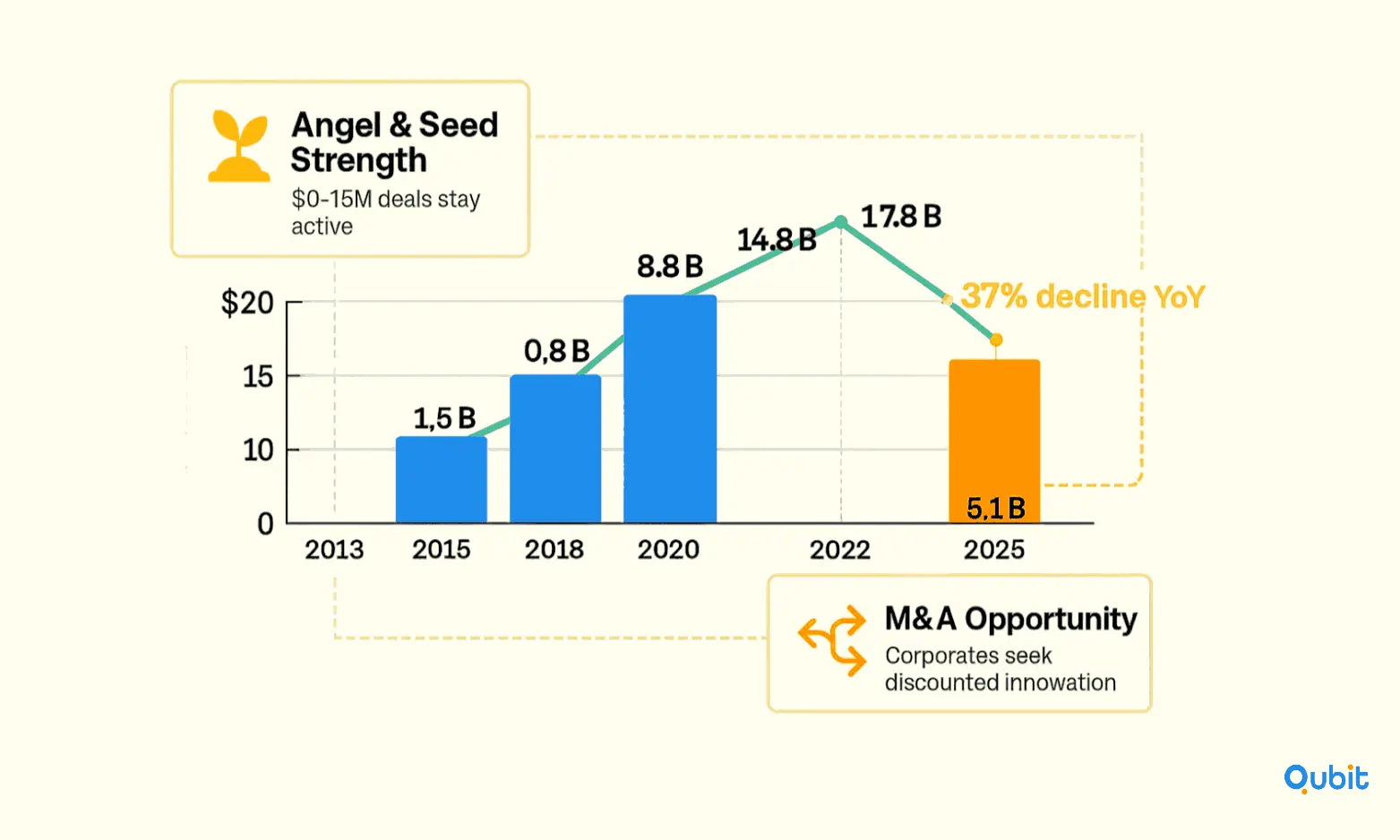The FoodTech industry is experiencing a surge in innovation, attracting angel investors eager to support transformative ideas. From sustainable packaging solutions to AI-driven food production, these ventures are reshaping how we grow, distribute, and consume food. Angel investors play a pivotal role in fueling early-stage startups, offering not just capital but also mentorship and industry connections.
For FoodTech founders, understanding how to secure funding for agritech startups provides a foundational framework to approach angel investors strategically. Insights provided in how to secure funding for agritech startups establish a foundational framework that contextualizes the funding strategies discussed in this guide.
This blog empowers FoodTech entrepreneurs with actionable strategies, advanced filtering techniques, and real-life case studies to connect with the right investors.
The State of FoodTech Investing: Funding Crunch and Opportunity
The global FoodTech story of the last decade is one of meteoric rise and correction. FoodTech’s total VC funding jumped more than fivefold from 2013 to the post-pandemic peak, but by 2025 the sector is seeing a correction. The first half of 2025 witnessed just $5.1 billion in global agrifoodtech investments, a 37% drop from the previous year, and the lowest total since 2015. This recalibration reflects global venture capital shifting to safer, sometimes more AI-centric bets.

Despite the numbers, FoodTech is far from moribund. In fact, the market’s natural “pruning” phase—where weaker business models recede and resilient, innovative startups gather more attention—has created a fertile ground for smart angel investors. These investors, often more willing than VCs to fund bold ideas at the earliest stages, are now crucial for FoodTech’s new wave.
Current funding trends to note:
- Early-stage ($0-15M) investments remain relatively resilient, signaling continued angel interest and faith in greenfield innovation.
- Breakout and late-stage deals have slowed more sharply, making angel and seed funding all the more critical for founders.
- M&A activity is surging: Strategic exits are increasingly attractive for founders and angels as larger food corporations hunt for discounted innovation.
Angel Investor Profile: Motivation and Evolving Focus
The archetype of the FoodTech angel in 2025 is distinct:
| Angel Profile | Characteristics | Typical Focus |
|---|---|---|
| Serial Entrepreneurs | Exited founders investing in new ideas | Scalable tech, supply chain, platforms |
| Food Industry Insiders | Experience in CPG, distribution, retail | Ingredient innovation, logistics, digital retail |
| Impact Investors | Prioritize sustainability, impact, health | Alternative proteins, upcycling, agri-biotech |
| Tech Visionaries | Background in AI, IoT, data platforms | AI in food safety, automation, B2B foodtech |
Emerging priorities for FoodTech angels:
- Sustainability: From regenerative agriculture to circular food systems, angel investors increasingly support ventures with an ESG edge.
- Enabling technologies: Automation, AI-powered logistics, and smart supply chains now attract as much or more interest than end-consumer apps.
- Resilience: Investors want startups that address food security in the face of extreme weather, geopolitical shocks, and global supply chain disruptions.
Their approach is now characterized by greater diligence, hands-on guidance, and an emphasis on robust go-to-market plans rather than “growth at all costs.”
Angel Investors & Venture Capitalists in the Food Tech Market
The FoodTech market has become a hotspot for innovation, attracting angel investors and venture capitalists eager to fund the next big breakthrough. Angel investors, in particular, play a pivotal role in supporting early-stage startups, often providing not just capital but also mentorship and industry connections. In 2021 alone, angel investors participated in funding rounds totaling an impressive $6.2 billion in the FoodTech sector, according to Dealroom.co. This figure underscores the growing importance of angel investments in driving the industry forward.
The Growing Momentum of Angel Investments
The FoodTech sector has seen a remarkable increase in angel investment activity over the years. Between 2016 and 2021, the number of angel funding rounds more than doubled, growing by 2.1x, as reported by Dealroom.co. This upward trend highlights the sector's potential and the confidence investors have in its future.
For entrepreneurs, this growth represents an opportunity to secure funding in a competitive yet thriving market. By leveraging tools like Angel Match, founders can position themselves strategically, ensuring they connect with investors who not only provide capital but also share their passion for innovation in FoodTech.
How To Find Right Investors For Your Agritech Startups
Finding the right angel investors requires precision, and filtering tools can help founders streamline their search. By narrowing down options based on specific criteria, founders can focus on investors who align with their goals and vision.
Location-Based Filters
Geographic proximity often plays a crucial role in investor relationships. Many investors prefer working with startups in their region due to logistical convenience and familiarity with local markets. Founders can refine their search by selecting investors based on city, state, or country, ensuring they target individuals or firms with a vested interest in their area.
Market Focus
FoodTech spans diverse niches, including sustainable agriculture, plant-based products, and food delivery innovations. Filtering investors by their market focus allows founders to connect with those who have expertise and interest in their specific domain. This alignment can lead to more meaningful partnerships and tailored guidance.
Investment Stage
Every investor has a preferred stage of involvement, whether it's seed funding, early-stage investments, or growth capital. Founders can use filters to identify investors who specialize in their current phase of development. For instance, startups seeking initial funding may prioritize angel investors or seed-stage venture capitalists.
Investor Type
The type of investor can significantly impact the funding process. Founders can choose between individual angel investors, venture capital firms, or corporate investors based on their needs. Angel investors often provide hands-on mentorship, while venture capital firms may offer larger funding rounds and strategic resources.
To supplement these filtering strategies, founders can explore alternative financing models, such as crowdfunding agritech startups. This approach highlights community-supported investment opportunities, offering a unique way to secure funding while engaging with a broader audience.
FoodTech’s Six Megatrends: Angel Investment Hotspots
Expert analysis coalesces current FoodTech innovation into six “megatrends,” each representing distinct—and sometimes overlapping, frontiers for angel capital:
a. The Resilient Farm
- What’s hot: Agtech, climate-resilient crops, soil health platforms, precision irrigation, drone-based farm analytics.
- Why angels care: Ventures in this segment have the potential for global impact and often align with grant funding, blending non-dilutive support with equity investment.
- Example: Startups using remote sensing and AI to optimize planting and water use are actively attracting seed-stage angel involvement.
b. Sustainable Ingredients
- What’s hot: Plant-based proteins, upcycled foods, microbial fermentation, cultivated meat.
- Key trend: The market for meat substitutes alone is forecast to grow at nearly 11% CAGR over the next seven years.
- Angel edge: Investors here often value IP protection and scalability—can the startup transition from lab bench to supermarket shelf?
c. Food as Medicine
- What’s hot: Functional ingredients, personalized nutrition, gut-health analysis, digital therapeutics linked to diet.
- Why now: As chronic disease and health costs rise worldwide, consumers and insurers alike seek out food-based solutions. Angels often bring expertise from adjacent healthtech and biotech fields.
d. The Smart Supply Chain
- What’s hot: Cold chain monitoring, digital traceability, adaptive logistics platforms, food waste tracking.
- Market gap: Global food loss remains immense due to logistics failures; AI-powered monitoring and transparency add both sustainability and ROI.
e. Digital Retail & Food Automation
- What’s hot: Grocery e-commerce platforms, next-gen vending, autonomous kitchens, robotics for prep and delivery.
- Here’s the play: As margins get squeezed in food delivery and retail, angels focus on automation and B2B solutions that deliver operational savings.
f. Regenerative Agriculture Finance
Investment rationale: With global regulatory regimes pushing for net-zero agriculture, fintech-style solutions in the food chain are a growing niche for angels seeking early first-mover advantage
- What’s hot: Finance and insurance tech for regen-ag practices, carbon tracking.
- Investment rationale: With global regulatory regimes pushing for net-zero agriculture, fintech-style solutions in the food chain are a growing niche for angels seeking early first-mover advantage
FoodTech Startup Success: Traits Angels Are Backing
Despite the tougher funding environment, success stories keep emerging—driven by founders who can demonstrate not only a transformative product, but thoughtful answers to how their business thrives in a capital-constrained world.
Critical traits and business models winning angel support in 2025:
Startup Spotlights
- Foodtel: Swedish startup revolutionizing cold chain monitoring with cloud-based analytics, enabling real-time food waste prevention—addressing both a $1 trillion global loss problem and ESG investor criteria.
- Revo Foods: Creating 3D-printed meat alternatives; a scalable platform for flavor and texture innovation relevant for global urban markets.
- Biokraft Foods: A leader in cultivated meat bioprinting—tapping into both sustainability and food safety mega-trends.
Investment Strategies: How Angels Adapt in a Maturing Market
With overall funding down and valuations recalibrating, angels are deploying capital more thoughtfully, seeking out new syndication models, and demanding evidence of product-market validation.
Syndicates and MicroFunds
Many solo angels are now participating in syndicates or joining microfunds that specialize in FoodTech. These groups allow for:
- Larger pooled check sizes, increasing influence in oversubscribed rounds
- Shared due diligence resources and expert deal filtering
- Collaboration with accelerators and sector-specific incubators
Milestone-Based Funding
Rather than long, open-ended runway, there’s a notable rise in milestone-based tranches—where funding is released as startups hit technical, regulatory, or commercial benchmarks.
Co-investment with Corporates
Corporates remain active in FoodTech, particularly for strategic investments. Angels frequently seek out syndicate partners that can align with potential acquisition or partnership opportunities, positioning startups for attractive exits or joint ventures.
Supporting M&A Readiness
Given the uptick in acquisitions as a pathway for startups unable to scale alone, successful angels are coaching founders on preparing not just for longer-term independence, but also for near-term integration. This means focusing on:
- Building interoperable tech and data standards
- Documentation and regulatory compliance
- Customer contracts and intellectual property hygiene
Market Challenges and the New FoodTech Reality
Challenging Macroeconomics, Resilient Innovation
2025’s market is not an easy one: broader economic anxieties, supply chain shocks, climate volatility, and a tech market still digesting the rollercoaster of the last four years make for risk-aware capital deployment.
VCs and angels alike have shifted from “spray and pray” to “stay and support.” This means startups need not just an exciting pitch, but robust plans for:
- Regulatory headwinds, especially around novel food ingredients and cell-cultured products
- Navigating global supply chains amid climate disruptions
- Building teams ready for capital efficiency, scale, and resilience
Geography and Regulatory Divergence
FoodTech is a global industry, but regulatory and market readiness varies widely:
- Europe is currently leading on sustainable ingredients and food-as-medicine regulations, but go-to-market there may require longer roadmaps and more certifications.
- Asia is moving rapidly on agtech and digital retail but shows variable public acceptance for “novel” food products.
Angels with global networks or cross-border experience are able to provide guidance far beyond a check, helping startups build for both local and international scaling.
Trends That Will Shape Angel Investing in FoodTech Through 2025 and Beyond
Key growth vectors:
- AI’s growing role: Startups deploying AI for supply chain innovation, food safety, and “smart food” formulation are fast-tracking through funding bottlenecks.
- Resilient farming and supply chains: Innovators that “climate-proof” agriculture, logistics, or food retail are high on the radar as extreme weather events become the new normal.
- Personalization: Whether it’s nutrigenomics, personalized meal kits, or apps that help consumers meet health or environmental goals, angels are bullish on genuine personalization at scale.
A closing note on the market’s resilience:
Despite a tough year, foodtech’s long-term megatrends, from alternative proteins to sustainable logistics—are driving renewed focus and smarter capital allocation. Those startups that execute on robust business fundamentals, tech defensibility, and scalable go-to-market strategies will find angel support, market cycles notwithstanding.
Conclusion
Securing angel investment in FoodTech requires more than just presenting numbers; it demands a compelling narrative that resonates with investors. Throughout this blog, we’ve explored strategies to craft a detailed pitch, emphasizing the importance of storytelling, market insights, and clear financial projections. These elements are vital for building trust and showcasing your startup’s potential.
A narrative-driven approach not only engages investors but also highlights your vision and commitment to innovation in the FoodTech space. By applying the insights shared here, you can create a pitch that stands out and drives action.
If you’re ready to take the next step, our Pitch Deck Creation service is designed to help you build a compelling pitch deck that captures investor interest. Contact us today to get started!
Key Takeaways
- Angel investors continue to play a pivotal role in driving FoodTech funding with significant growth trends.
- Advanced filtering options empower founders to precisely target ideal investment partners.
- The comprehensive investor directory offers deep insights into investor profiles and market statistics.
- Real-life case studies and data-backed trends illustrate both the opportunities and challenges in FoodTech investments.
Frequently asked Questions
Who are the top angel investors in foodtech?
Top angel investors in foodtech are typically those with a strong track record in early-stage investments, specializing in innovative FoodTech startups. They often provide not only capital but also strategic mentorship and industry connections.






